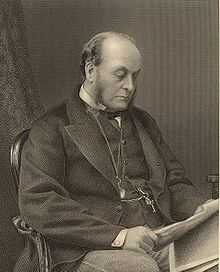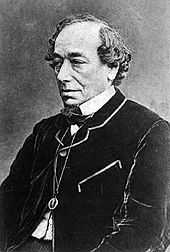Gathorne Gathorne-Hardy, 1st Earl of Cranbrook
| The Right Honourable The Earl of Cranbrook GCSI PC | |
|---|---|
 | |
| Home Secretary | |
| In office 17 May 1867 – 3 December 1868 | |
| Monarch | Victoria |
| Prime Minister | The Earl of Derby Benjamin Disraeli |
| Preceded by | Spencer Horatio Walpole |
| Succeeded by | Henry Bruce |
| Lord President of the Council | |
| In office 24 June 1885 – 6 February 1886 | |
| Monarch | Victoria |
| Prime Minister | The Marquess of Salisbury |
| Preceded by | The Lord Carlingford |
| Succeeded by | The Earl Spencer |
| In office 3 August 1886 – 18 August 1892 | |
| Monarch | Victoria |
| Prime Minister | The Marquess of Salisbury |
| Preceded by | The Earl Spencer |
| Succeeded by | The Earl of Kimberley |
| Chancellor of the Duchy of Lancaster | |
| In office 3 – 16 August 1886 | |
| Monarch | Victoria |
| Prime Minister | The Marquess of Salisbury |
| Preceded by | Sir Ughtred Kay-Shuttleworth, Bt |
| Succeeded by | Lord John Manners |
| Personal details | |
| Born | 1 October 1814 |
| Died | 30 October 1906 (aged 92) |
| Nationality | British |
| Political party | Conservative |
| Spouse(s) | Jane Orr (d. 1897) |
| Alma mater | Oriel College, Oxford |
Gathorne Gathorne-Hardy, 1st Earl of Cranbrook GCSI PC (1 October 1814 – 30 October 1906), known as Gathorne Hardy until 1878, was a prominent British Conservative politician, a moderate, middle-of-the road Anglian. He held office in every Conservative government between 1858 and 1892 and notably served as Home Secretary from 1867 to 1868 and as Secretary of State for War from 1874 to 1878.
Background and education
Gathorne Hardy was the third son of John Hardy, of Bradford, and Isabel, daughter of Richard Gathorne. His father was the main owner of the Low Moor ironworks and also represented Bradford in Parliament. He was educated at Shrewsbury School and Oriel College, Oxford, and was called to the Bar, Inner Temple, in 1840. He established a successful legal practice on the Northern Circuit, being based at Leeds, but was denied when he applied for silk in 1855.
Early political career, 1847–1874
Hardy had unsuccessfully contested Bradford in the 1847 general election. However, after his father's death in 1855 he was able to concentrate fully on a political career, and in 1856 he was elected for Leominster. Only two years later, in 1858, he was appointed Under-Secretary of State for Home Affairs in the second administration of the Earl of Derby. He remained in this office until the government fell in June 1859.
In 1865 Hardy reluctantly agreed to stand against William Ewart Gladstone in the Oxford University constituency. However, he defeated Gladstone by a majority of 180, which greatly enhanced his standing within the Conservative party. The Conservatives returned to office under Derby in 1866, and Hardy was now appointed President of the Poor Law Board, with a seat in the cabinet. He was admitted to the Privy Council at the same time. During his tenure in this office he notably carried a poor law amendment bill through parliament. Cranbrook also supported the Reform Act of 1867, which significantly increased the size of the electorate to one in five. By May Disraeli had recognised Gathorne Hardy's value to the Conservatives as a rising star in the Commons, proving a capable debater, a resilient antagonist to Gladstone, and nobody's fool.[1] In 1867 he succeeded Spencer Walpole as Home Secretary and was forced to deal with the Fenian Rising of that year. By accepting an amendment that all ratepayers should be enfranchised, Disraeli had created a new Victorian constitution, which surprisingly Hardy and the others were prepared to accept.[2]
The next year, Benjamin Disraeli succeeded Derby as Prime Minister, but the Conservative government resigned later in 1868, and the Liberals came to power under Gladstone. In opposition, Hardy occasionally acted as opposition leader in the House of Commons when Disraeli was absent. On 1 February 1872, Hardy was present at the Burghley House Conference of Tory grandees; only Derby and Disraeli were missing.
Cabinet minister, 1874–1880
In 1874 the Conservatives returned to office under Disraeli, and Hardy was appointed Secretary of State for War. He served in this post for more than four years overseeing the army reforms initiated by his Liberal predecessor Edward Cardwell. In 1876 Disraeli was elevated to the peerage as Earl of Beaconsfield and the Lords. Hardy had expected to become Conservative leader in the House of Commons, but was overlooked in favour of Sir Stafford Northcote.
Two years later, in April 1878, he succeeded The Marquess of Salisbury as Secretary of State for India, and the following month he was raised to the peerage as Viscount Cranbrook, of Hemsted in the County of Kent. At the same time he assumed his mother's maiden surname of Gathorne in addition to that of Hardy at the request of his family. The Eastern Question had posed the biggest single foreign policy dilemma in 1877. Hardy was in favour of actively pursuing the bankrupted Sultan with a loan, and going to war if necessary to keep Russia out of Constantinople. He proved one of Disraeli's closest allies in cabinet. Hardy was a relative parvenu; the rich aristocrats wanted peace and so did Gladstone, at any price. But he was vindicated; when Salisbury swapped sides to support the PM, he was raised to Foreign Minister. A War Party sent Royal Navy battleships to defend the Turks against a threatening Russian Army. At the India Office he was forced to deal with the Second Afghan War in 1878, aimed at restoring British influence in Afghanistan. After a peaceful summer of 1878 deer-stalking in Scotland, Cranbrook returned to a crisis for an ill-prepared Viceroy of India. A full invasion of Afghanistan was ordered on 21 November. The Afghans were defeated within weeks, but the new Third Empire had begun in a state of panic. A peace deal was struck in May 1879, but war again erupted after the British resident, Sir Louis Cavagnari, was murdered by mutinous Afghan troops. British troops under Frederick Roberts managed once again to restore control. However, the situation was still volatile when Cranbrook, along with the rest of the government, resigned in April 1880. As a peer Cranbrook was disqualified from making speeches during elections, which ended in a Liberal majority. He took a well-earned rest in Italy early in 1881, and was still there when the only one of Disraeli's cabinet absent for the Hughenden funeral.[3]
Tory grandee
In June 1885 the Conservatives, now under the leadership of Lord Salisbury, returned to power as "Caretakers", and Cranbrook was made Lord President of the Council. For two weeks in early 1886 he again served as Secretary of State for War. The government fell in January 1886 but soon returned to office in July of the same year after a General Election under a new franchise. Cranbrook was once again appointed Lord President of the Council, in which office he was mainly concerned with education. He also served briefly as Chancellor of the Duchy of Lancaster in August 1886. He declined the post of Foreign Secretary in 1886 owing to his inability to speak foreign languages, and also refused the viceroyalty of Ireland. He remained as Lord President of the Council until the second Salisbury ministry fell in 1892. Shortly after, he was further honoured when he was made Baron Medway, of Hemsted in the County of Kent, and Earl of Cranbrook, in the County of Kent. In opposition, Cranbrook was a strong opponent of the Second Home Rule Bill, which was heavily defeated in the House of Lords. He retired from public life after the 1895 general election.
Family
Lord Cranbrook married Jane, daughter of James Orr, in 1838. They had four sons and five daughters. One son and two of their daughters predeceased them. Lord Cranbrook died in October 1906, aged 92, and was succeeded by his eldest son John. His third son the Hon. Alfred Gathorne-Hardy was also a politician.[4]
Notes
References
 Lee, Sidney, ed. (1912). "Gathorne-Hardy, Gathorne". Dictionary of National Biography, 1912 supplement 2. London: Smith, Elder & Co.
Lee, Sidney, ed. (1912). "Gathorne-Hardy, Gathorne". Dictionary of National Biography, 1912 supplement 2. London: Smith, Elder & Co. - Kidd, Charles, Williamson, David (editors). Debrett's Peerage and Baronetage (1990 edition) (New York 1990)
- Leigh Rayment's Peerage Pages
- Leigh Rayment's Historical List of MPs
External links
| Wikimedia Commons has media related to Gathorne Gathorne-Hardy, 1st Earl of Cranbrook. |
- Hansard 1803–2005: contributions in Parliament by the Earl of Cranbrook
| Parliament of the United Kingdom | ||
|---|---|---|
| Preceded by George Arkwright John George Phillimore |
Member of Parliament for Leominster 1856–1865 With: John George Phillimore 1856–1857 John Pollard Willoughby 1857–1858 Charles Kincaid-Lennox 1858–1865 |
Succeeded by Arthur Walsh Richard Arkwright |
| Preceded by William Ewart Gladstone Sir William Heathcote, Bt |
Member of Parliament for Oxford University 1865–1878 With: Sir William Heathcote, Bt 1865–1868 John Robert Mowbray 1868–1878 |
Succeeded by John Robert Mowbray John Gilbert Talbot |
| Political offices | ||
| Preceded by William Nathaniel Massey |
Under-Secretary of State for the Home Department 1858–1859 |
Succeeded by George Clive |
| Preceded by Charles Pelham Villiers |
President of the Poor Law Board 1866–1867 |
Succeeded by The Earl of Devon |
| Preceded by Spencer Horatio Walpole |
Home Secretary 1867–1868 |
Succeeded by Henry Bruce |
| Preceded by Edward Cardwell |
Secretary of State for War 1874–1878 |
Succeeded by Frederick Stanley |
| Preceded by The Marquess of Salisbury |
Secretary of State for India 1878–1880 |
Succeeded by Marquess of Hartington |
| Preceded by The Lord Carlingford |
Lord President of the Council 1885–1886 |
Succeeded by The Earl Spencer |
| Preceded by William Smith |
Secretary of State for War 1886 |
Succeeded by Henry Campbell-Bannerman |
| Preceded by Sir Ughtred Kay-Shuttleworth, Bt |
Chancellor of the Duchy of Lancaster 1886 |
Succeeded by Lord John Manners |
| Preceded by The Earl Spencer |
Lord President of the Council 1886–1892 |
Succeeded by The Earl of Kimberley |
| Peerage of the United Kingdom | ||
| New creation | Earl of Cranbrook 1892–1906 |
Succeeded by John Stewart Gathorne-Hardy |
| New creation | Viscount Cranbrook 1878–1906 | |
| ||||||||||||||||||||||||||||||||||||||||||||||||||||||||
| ||||||||||||||||||||||||||||||||||||||||||||||||||||||||||||||||||||||||||||
|
.svg.png)

